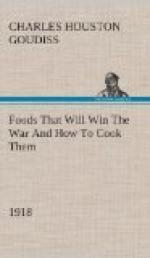[Illustration]
SAVE SUGAR
REASONS WHY OUR GOVERNMENT ASKS US TO SAVE SUGAR WITH PRACTICAL RECIPES FOR SUGARLESS DESSERTS, CAKES, CANDIES AND PRESERVES.
One ounce of sugar less per person, per day, is all our Government asks of us to meet the world sugar shortage. One ounce of sugar equals two scant level tablespoonfuls and represents a saving that every man, woman and child should be able to make. Giving up soft drinks and the frosting on our cakes, the use of sugarless desserts and confections, careful measuring and thorough stirring of that which we place in our cups of tea and coffee, and the use of syrup, molasses or honey on our pancakes and fritters will more than effect this saving.
It seems but a small sacrifice, if sacrifice it can be called, when one recognizes that cutting down sugar consumption will be most beneficial to national health. The United States is the largest consumer of sugar in the world. In 1916 Germany’s consumption was 20 lbs. per person per year, Italy’s 29 to 30 lbs., that of France 37, of England 40, while the United States averaged 85 lbs. This enormous consumption is due to the fact that we are a nation of candy-eaters. We spend annually $80,000,000 on confections. These are usually eaten between meals, causing digestive disturbances as well as unwarranted expense. Sweets are a food and should be eaten at the close of the meal, and if this custom is established during the war, not only will tons of sugar be available for our Allies, but the health of the nation improved.
The average daily consumption of sugar per person in this country is 5 ounces, and yet nutritional experts agree that not more than 3 ounces a day should be taken. The giving up of one ounce per day will, therefore, be of great value in reducing many prevalent American ailments. Flatulent dyspepsia, rheumatism, diabetes, and stomach acidity are only too frequently traced to an oversupply of sugar in our daily diet.
Most persons apparently think of sugar merely as a sweetening agent, forgetting entirely the fact that it is a most concentrated food. It belongs to what is called the carbohydrate group, upon which we largely depend for energy and heat. It is especially valuable to the person doing active physical work, the open-air worker, or the healthy, active, growing child, but should be used sparingly by other classes of people. Sugar is not only the most concentrated fuel food in the dietary, but it is one that is very readily utilized in the body, 98 per cent. of it being available for absorption, while within thirty minutes of the time it is taken into the system part of it is available for energy.
As a food it must be supplied, especially to the classes of people mentioned above, but as a confection it can well be curtailed. When it is difficult to obtain, housekeepers must avail themselves of changed recipes and different combinations to supply the necessary three ounces per day and to gain the much-desired sweet taste so necessary to many of our foods of neutral flavor with which sugar is usually combined.




